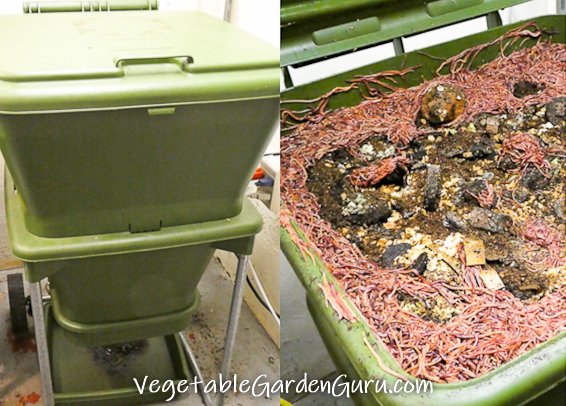| Back to Back Issues Page |
 |
|
Under the Arbor Issue 40 July 21, 2023 |
In This Issue:~ Worm Farming ~The Other Half of the Gardening Equation
Hungry Bin Worm Explosion after Feeding a Treat of Oats and Dried Molasses Composting is not the same thing as worm farming. A properly made compost pile, whether in a bin, a drum or a pile, will heat up to temperatures that will kill earthworms. Raising earthworms requires more careful attention to inputs, so as to not raise temperatures or allow the pile to get too dry, wet or acidic. Both composting and worm farming are essential aspects of my little mini-farm. Not only do I nurture the native worms that reside in the soil of my various vegetable and pollinator beds, I also have a year-round indoor worm bin that recycles much of our compost. But because we go through lot of onions, lemons, and other things that the worms don't like, I also have two big homemade compost bins out back under the apple tree, which also takes twigs, end-of-season stalks, stems, leaves, etc. The worm operation requires more specific and balanced inputs. For years I managed 2 or 3 homemade worm bins, each made from a pair of nestling 10-gallon Rubbermaid tubs. The top ones had some holes drilled in the bottom so the worms could go back and forth between the upper and lower bins, and the lids had mesh windows for ventilation. The bottom bin was mostly castings and partly digested bits of bedding and food, and the top was where I put in the fresh bedding and food. The tubs worked well, but pushing the partially-eaten food to one side, putting the fresh food and bedding in one corner, and having to separate the worms from the castings on a tarp in the sun when I'd go to harvest, was time-consuming and easily neglected when mid-summer chores became all-consuming. The Hungry BinThen about 10 years ago I saw a video about the Hungry Bin, a commercially made "flow through" worm bin. It showed how easy it was to maintain, how many castings it produced, how efficient it was, etc. Hey, it was an ad, but I'm afraid it hooked me. I'm an inveterate DIY kind of person, and I balked at the price, ($300 at the time)… but I finally splurged and bought one.I have no regrets - I absolutely love the thing. In a flow-through bin, you put bedding and food waste on the top, and harvest worm castings out the bottom. That's it. It produces a phenomenal amount of castings, without the intensive management of the Rubbermaid tub bins. But my favorite thing? It ate its own shipping box! (Of course the bin didn't… the worms did, but you get the idea). I cut the box into strips with a box knife, and fed a few strips in every time I added kitchen scraps. The food scraps sogged up the cardboard strips over time, which the worms ate along with the kitchen scraps. It's the consistency of the castings out of the Hungry Bin - in both senses of the word - that has made it worth every penny. The production output is consistent, and the castings themselves are a wonderful, fine consistency. And it's also the convenience: in the top, out the bottom. It has become an essential part of my "farm". Now even though I don't write about them here, I also happen to have a laying flock of Welsh harlequin ducks as part of the "farm" (our unofficial, but fitting, name is "Odd Ducks Farm"). If you ever want to make a duck your BFF, hand feed her red wiggler worms once in awhile to supplement what she gets from the weed patch (former lawn) after a rain. I've written previously about how superb worm castings are for the garden, so I won't duplicate that info here. But if you want to make your soil happy, your food nutrient-dense and bursting with health and flavor, add worm farming to your own operation and worm castings to your soil. You can buy a small kitchen worm composter at Gardener's Supply Company, or a Hungry Bin at Uncle Jim's Worm Farm. DedicationVegetable Garden Guru is dedicated to the renewal of regenerative, sustainable, organic vegetable gardening around the world. May we become gardeners of healthful, nutrient-dense food, careful stewards of soil, and may the plants we tend remind us to always keep growing toward the Light.
|
| Back to Back Issues Page |

